11 Sustainable Sneakers & Brands Making Ethical Strides & Eco-Kicks
Let’s put some sustainability in your step…by moving toward sustainable sneakers.
To be frank, the traditional footwear industry stinks.
But the last few years have seen leaps and bounds of progress, and we now have a healthy selection of ethical sneakers to put your best eco foot forward.
Everything we recommend to you on Sustainable Jungle is independently researched and we ask all brands to confirm their claims. To avoid waste, we test products on an as needed basis. This post contains affiliate links. If you buy something through our links, we may earn a small commission. Learn more about why we do this here.
The Best Sustainable Sneakers You’ll Shoe-rly Love
For the athletically-inclined, and for those who love wearing slippers, Allbirds in our opinion offer some of the most sustainable sneakers on the market.
Then there’s Baabuk, whose 100% Portuguese and Swiss sheep wool kicks are the most colorful head-turners we’ve seen. Did we mention they’re also super soft—on both your feet and the planet.
The most unique sustainable sneaker brand award goes to 8000Kicks who make the world’s “first waterproof cannabis sneaker”, and with hemp insoles we found these about as comfortable as cork. Which is saying a lot!
To read more about why ethical sneakers are necessary and how these brands made the cut, keep reading or click here (or watch our video below).
No sense in standing still…Let’s get moving with the best sustainable sneaker brands.
The Full List Of Sustainable Sneakers Brands
1. Allbirds
About Allbirds
Price Range: $105–$170
Allbirds is a San Francisco-based Certified B Corp that makes sustainable running shoes for women, men, and kids (or “smallbirds”).
Besides sustainable running sneakers, they make more loungers, boat shoes, everyday sneakers (including water-repellant ones) and hiking shoes—like the Trail Runner SWT which features mostly bio-based components.
This sustainable basics brand offers garments for the rest of the body, too.
Allbird’s Ethical & Sustainability Practices
Materials:
We’ve done a deep dive on Allbirds’ sustainability but for the sake of brevity, here’s the summary.
Allbirds’ non-vegan sustainable sneakers are made using superfine ZQ Merino (which adheres to the most stringent ethical wool and most animal welfare standards) which demands 60% less energy to make than synthetic shoes.
Their vegan Tree lines—like the ultra-classic Tree Pipers—are made of eucalyptus pulp TENCEL Lyocell grown with 95% less water and produced in a clean, closed-loop process.
The laces are made of recycled water bottles and threaded through bio-based TPU eyelets.
They use partial castor bean oil in their midsole to minimize synthetic content (though there is still some EVA here). For the outsoles, they are transitioning to using a new material called SweetFoam, made from Brazilian sugarcane certified by Proforest.
Since its byproducts are used to power the mill and fertilize the field, it’s the world’s first carbon-negative EVA.
Supply chain & labor practices:
Their merino is sourced from New Zealand and spun in Milan, Italy in Europe’s only wool mill sustainably certified by the European Commission.
The Tree collection is made with FSC-certified eucalyptus from South African farms that are then made by the Austrian company Lenzing.
Finished fabrics get assembled at WRAP-certified factories in South Korea and China.
Green business practices:
They also use 90% recycled cardboard packaging “because every box deserves a second chance”.
They are Carbon Neutral by offsetting all business operations.
Community & charitable giving:
Through their partnership with Soles4Souls, they donate lightly used, returned shoes to communities in need.
2. 8000Kicks
About 8000Kicks
Price Range: $135
Portugal-based 8000Kicks make the world’s “first waterproof cannabis sneaker.”
We know what you’re thinking and no, you can’t smoke the shoe (it has less than 0.3% THC) and no, TSA won’t detain you if you wear these on your next flight.
Finished cannabis products are 100% legal around the world.
The only kind of high these sustainable workout sneakers will give you is a runner’s high, especially with how light and breathable they are.
The hemp shoe brand offers two styles: the versatile Explorer V2 and the Seeker sustainable skate shoes.
While most come in solid colors that contrast the white sole, they do offer one all-black V2 for those seeking black ethical sneakers.
8000Kick’s Ethical & Sustainability Practices
Materials:
Each shoe upper is made from responsibly sourced cannabis hemp fabric, which is not only durable (as proven by their “torture” tests) but eco-friendly waterproof sneakers.
The insoles are also hemp, which is antimicrobial and antibacterial.
The outsoles are made of Bloom foam algae which helps sponsor the removal of harmful algae from marine ecosystems.
Supply chain & labor practices:
Both their cork and recycled outsole materials are sourced and made in Portugal in a factory that provides free health care and education to its employees. The hemp is sourced in China, Romania, and France.
Their other factory is located in China, which also holds strict labor standards.
They choose China because “the best hemp in the world comes from there [and] we refuse to make shoes with second quality hemp.”
Green business practices:
The hemp fibers are turned into fabric using a non-chemical “steam explosion” process.
Compared to average traditional sneakers, each pair of sneakers requires 72% less CO2 and 70% less water to manufacture.
Both factories use some venerable energy and 8000Kicks offsets its emissions through hemp farming and additional tree planting.
3. Baabuk
About Baabuk
Price Range: $129–$139
Baabuk is a family-owned Swiss company that started with a simple Christmas gift: a pair of traditional Russian Valenkis felted shoes.
Now an ISPO Gold award-winning brand, they continue crafting cozy sustainable slippers and some of the most affordable ethical sneakers.
For sustainable sneakers, choose between their low-rise Urban Woolers and high-top Sky Woolers.
Or choose their Baabuk by You option and custom-build your own pair.
Baabuk’s Ethical & Sustainability Practices
Materials:
Wool is the base of all Baabuk booties, mulesing-free and ethically sourced from kindly treated sheep.
The Urban Woolers are their more sustainable sneakers, made of 100% Portuguese sheep wool, a soft Merino inner lining, and a durable TPU Thermoplastic sole.
The Sky Woolers also contain an upper and inner made from Portuguese mulesing-free sheep wool, but their soles are made of rubber and top-grain Nubuck leather.
Supply chain & labor practices:
This Certified B-Corp says, “We love wool but we aren’t sheep”, which is why their supply chain is fully traceable and ethical.
They guarantee safe working conditions, no child labor, equal employment opportunities for women, and a 25% higher salary than the national average.
Their sneakers are 100% made in Portugal, including sourcing the wool from sheep in Serra de Estela Natural Park.
Felting occurs in Portugal’s historic Burel Factory (in the town of Manteigas near where the sheep are raised). This factory is famous for its long wool-making tradition using either hand techniques or 100+-year-old machinery.
Green business practices:
Baabuk chooses wool because of its compostable end-of-life prospect and eco-friendly nature. In fact, wool is 50% carbon sequestered through a sheep’s diet.
They offer a repair kit for $5 to help extend the life of your shoes and encourage folks to repair rather than replace.
Their sneakers are also machine washable.
Community & charitable giving:
Their Miss Baabuka project partners them with the Swiss organization ProSpecieRara. They support this organization’s conservation mission targeting six rare sheep breed populations.
4. Cariuma
About Cariuma
Price Range: $79–$169
Cariuma makes sustainable skate shoes in a way that’s better for people and the planet.
Unlike industry-standard, fashion-over-function shoes, Cariuma’s are “good-looking, crazy comfy and consciously made”.
These comfy ethical sneakers for women and eco-friendly men’s shoes are available in several styles: slip-ons, low tops, high tops, and more.
Cariuma’s Ethical & Sustainability Practices
Materials:
Cariuma uses a range of natural materials like FSC and OEKO-TEX certified bamboo, BCI and GOTS certified organic cotton, and natural rubber.
Their insoles are made from ethically sourced Brazilian sugarcane (a polyethylene produced by I’M GREEN), cork, and mamona oil (a plant-based alternative to petroleum-based foam).
For vegan sustainable sneakers, the uppers, laces, thread, and labels are made with GRS-certified recycled PET bottles.
Their ethical leather sneakers use LWG-certified leather and suede for the upper. The leather is produced using recycled/reused water and renewable energy and is not associated with deforestation.
Only bluesign®-approved, non-toxic dyes are used.
Supply chain & labor practices:
Following ILO guidelines, Cariuma prioritizes the health and well-being of its workers through living wages and a manageable work week.
Their Code of Conduct is adhered to by their WRAP-certified manufacturing partner.
They’re taking steps towards certifying and improving traceability for their suppliers, too.
Green business practices:
The only true answer to sustainability is to buy less—which is why the sneakers are designed to be worn for a long time. Their sneaks have a protective toe cap and a fully-stitched outsole.
They’re also working on a program to recycle or reuse excess materials and only use recycled and recyclable packaging.
Community & charitable endeavors:
For every pair of sustainable sneakers purchased, two trees are planted in the founders’ homeland of Brazil.
5. Thousand Fell
About Thousand Fell
Price Range: $125–$135 (+$20 refundable recycling deposit)
Thousand Fell is the maker of the “best sustainable sneakers for a better tomorrow”—by which they mean the first zero waste, closed loop, recyclable and recycled sneakers.
Between sustainable design and easy-to-recycle materials, sustainable tennis shoes are made to wear over and over again—which means they won’t wear down our planet either.
They have lace-up and slip-on women’s and men’s sustainable sneakers.
Thousand Fell’s Ethical & Sustainability Practices
Materials:
The soles are made with natural and recycled rubber (from a net zero emission supplier).
The foam is made with castor beans, and the uppers, mesh liners, and laces are made with bio-leather blended from recycled bottles and corn waste.
The mesh sock liner also features aloe vera to combat bacteria.
For bits that usually require plastic, locally sourced food industry byproducts like sugar cane, palm leaf fibers, and coconut husk are used.
Keeping those ethical white sneakers white for longer (and contributing to the pair’s overall durability), they use a natural quartz barrier to make them stain and water-resistant.
Supply chain & labor practices:
The brand’s ethical canvas sneakers come together in a family-owned factory located in Brazil using as many locally sourced sustainable materials as possible.
They’re also a member of Textile Exchange, a nonprofit improving the textile industry.
Green business practices:
TS uses water and carbon offset programs and encases its shoes in an organic cotton tote bag that can be reused or repurposed.
The shoe box is also the shipping box, made with recyclable, FSC-certified, and carbon-neutral cardboard.
If you live in NYC, you’ll even get your shoes delivered by a bike messenger to minimize the shipping impact.
Their recycling program allows you to either drop off or mail back your old TF shoes for $20 towards a new pair. They partner with TerraCycle to recycle the raw materials in your shoes.
Community & charitable endeavors:
Thousand Fell is a member of 1% for the Planet.
Any shoes in decent condition returned by the recycling program are sent to Soles4Souls to give sneakers a second life somewhere in the global community.
6. Saola
About Saola
Price Range: $90–$130
Pronounced SOW-la (after an endangered animal), Saola makes “kickass” kicks designed to get outside.
Whether you’re looking to take a hike or just walk to the bus stop, this recycled shoe brand offers an impressive line of supportive eco-friendly sneakers to choose from.
Like the Tsavo line, whose lightweight, recycled knit uppers make them versatile enough for either occasion.
Saola’s Ethical & Sustainability Practices
Materials:
For the uppers, Saola mostly uses synthetic leather made from a 40/60 ratio of Recycled Gold Standard-certified PET and PU.
Their best sustainable sneakers feature uppers made with blended 100% recycled canvas knit with 90% recycled plastic bottles.
All have organic cotton laces, natural cork insoles, and a lower outsole made of recycled algae Bloom Foam. This removes harmful algae from natural water systems and converts it into a powder that gets mixed with EVA.
Some shoes instead use a partially recycled EVA for the outsoles.
Supply chain & labor practices:
This USA sustainable sneaker brand manufactures through a factory in southern China. One of the founders is permanently stationed in Asia to monitor its ethical standards.
Green business practices:
They choose to manufacture in China because many materials end up coming from China anyway, so it keeps shipping to a minimum.
Community & charitable giving:
Saola is named after one of the rarest animals on earth, only discovered in 1992 and with about 300 remaining. Needless to say, wildlife conservation is a top priority for Saola.
As a member of 1% for the Planet, 1% of proceeds go to the Mwalua Wildlife Trust, a grassroots wildlife conservation and biodiversity protection organization founded by Kenya native Patrick Kilonzo.
7. VEJA
About VEJA
Price Range: $70–$210
Brazilian for “look”, French brand VEJA is changing the way the world sees sneakers.
Instead of using petroleum-based materials and cheap manufacturing, they create environmentally friendly sneakers out of biodegradable, recycled, and/or partially biobased materials.
Their line of classic sustainable white sneakers or colorful kicks is available in women’s, men’s, kids’, or unisex sizes.
The Nova High Tops are available as men’s or women’s sustainable sneakers and bear that classic retro look that just never goes out of style.
VEJA’s Ethical & Sustainability Practices
Materials:
About ⅔ of VEJA’s eco-friendly sneakers feature vegetable or chrome-free tanned leather uppers sourced from LWG Gold-certified and REACH-compliant tanneries.
Their vegan models swap leather uppers for B-mesh (100% recycled plastic bottles), Hexamesh (layers of organic cotton and recycled PET), and corn-based vegan leather.
Other components are made from about ~60% biobased materials such as castor bean inserts, sugar cane midsoles and insoles, and Amazonian rubber and rice waste outsoles.
Lining, laces, and buckles are made from recycled polyester or recycled cotton.
Supply chain & labor practices:
This Certified B Corp runs the extra mile for their supply chain, purchasing materials like rubber and organic cotton for double market prices.
All raw materials are sourced and processed in Brazil, except for select cotton farming and spinning that takes place in nearby Peru.
Sneakers are assembled in a factory near Porto Alegre, where workers are protected by a fair trade code of conduct that provides fair wages, benefits, paid vacation, regular schedules, and protection from forced overtime.
They’ve calculated the cost to be 3x more to manufacture in Brazil than in China, but that’s a cost they’re willing to assume instead of placing it on the planet and laborers.
Green business practices:
VEJA makes up for those higher costs by forgoing advertising, which saves tremendous paper resources and money.
To see where they can improve, they’ve calculated their scope 1, 2, and 3 emissions and created an emissions report.
Old sustainable footwear can be repaired or recycled at their shops in France and NYC.
Community & charitable giving:
VEJA’s Paris warehouse employs disabled or disadvantaged workers to help them get back on their feet. 90% and 25% have had health or housing problems, respectively.
8. Orba
About Orba
Price Range: $96
Get in step with nature with Orba’s award-winning sustainable canvas tennis shoes.
With a name intentionally derived from the word “orb”, this eco-friendly sneakers brand prioritizes circularity through its innovative materials and biodegradable kicks.
They offer just one pair of organic sneakers: the lightweight and thermo-regulating Ghost Sneaker, available for both women and men.
Orba’s Ethical & Sustainability Practices
Materials:
Each organic sneaker features a canvas upper made of flax, hemp, and nettle (all renewable crops that grow using only rainwater and without pesticides).
This is paired with certified organic cotton laces, footbeds made of cork, coconut husk, and agave sisal, and an outsole made of natural rubber, rice husk ash, and coconut oil.
All in all, they’re 93% biodegradable, and the rest are still natural materials, consisting of non-biodegradable natural compounds like pine resin, titanium, zinc, and sulfur.
Supply chain & labor practices:
Designed in New Zealand but made in Indonesia, this Certified B Corp partners with a BSCI-compliant factory and upholds a strict supplier code of conduct.
To help their smaller suppliers become more sustainable, they provide funding for training programs along a pathway toward BSCI compliance.
Green business practices:
Because they’re not home-compostable (yet), they take full responsibility for the end-of-life outcome of their shoes by paying for you to return them so they can be placed in the proper environment to biodegrade.
The fair trade sneakers also come packaged in recycled cardboard prints with natural ink and have been tested with a Life Cycle Analysis to measure their CO2 emissions.
They outline a yearly sustainability plan in line with some of the UN’s SDGs, which currently includes obtaining a certification of full compostability for their shoes.
9. Nothing New
About Nothing New
Price Range: $89–$180
After learning about the horrifying statistics behind footwear, Nothing New decided to make a vow using sneakers made out of just that: absolutely nothing new.
Their sustainable canvas sneakers are made with either natural or 100% recycled materials.
Bearing ultra-classic designs in fun or basic colors, they offer sustainable high-top sneakers or low-top cuts for women and men.
Want to add some shimmer to your step?
Check out the Nova metallic recycled leather shoe.
Nothing New’s Ethical & Sustainability Practices
Materials:
The uppers are made of either upcycled Italian Beyond Leather™ or Better Canvas™, a 100% post-consumer Global Recycle Standard-certified recycled bottles, lined with cotton canvas sourced through the Better Cotton Index.
The heel counters come from 100% recycled fishing nets and the outsoles are a blend of recycled rubber, recycled cork, and natural rubber.
The ethical sneakers are finished with post-consumer plastic labels and laces, certified conflict-free copper and zinc alloy eyelets, and fully stitched construction (no glues or vulcanization).
Supply chain & labor practices:
This sneaker brand sources plastic waste for upcycling from Vietnam, Haiti, and Thailand, collected via a supplier that runs in accordance with the ten U.N. Global Compact principles and ILO.
The trash is processed into thread, dyed, and woven in ethical factories in China.
Green business practices:
They work with several carbon offset partners to be completely carbon neutral.
Their Virtuous Circle Program means you can send your worn-out Nothing New shoes back for free and get $20 off a new pair of sneakers. Your old shoes will get put back into use somewhere.
10. Third Mind
About Third Mind
Price Range: $125
Here’s a new word for you: integrinuity.
Coined by Third Mind, this brand combines integrity and ingenuity in the pursuit of responsible performance by making ethical luxury sneakers—at less-than-luxury prices.
This innovative company makes five sustainable men’s sneaker styles disguised to look like dress shoes, in every color from classic black to a magical magenta.
Third Mind’s Ethical & Sustainability Practices
Materials:
When you slide your feet into Third Mind’s shoes, you’re sliding on (and upcycling) ~20 recycled plastic bottles, though they may go by different names.
NatureTex® fabric is made of 100% recycled water bottles while Clarino® is a microfiber vegan leather that doesn’t require solvents to manufacture and produces 70% less wastewater and 35% less CO2 emissions.
Sciessent® Lava uses zeolites (crystalline structures made from aluminum, silicon, and oxygen) to trap odors and keep antimicrobial chemicals at bay.
Each pair of sustainable sneakers is made with 70% recycled materials, including a partially recycled rubber outsole.
Supply chain & labor practices:
Third Mind believes in “community before commodity”.
With every sale of fair trade sneakers, the brand supports workers with fair wages and livelihood opportunities to support their families and build a stronger community.
Most of the supply chain is in Putian, China. Each product description highlights how many workers are empowered with safe working conditions for each pair of shoes sold.
Green business practices:
All glues are water-based (VOC-free) and the dyes are non-polluting, which means Third Mind can recycle all water used in production.
With concerns about microplastics, they’re not washable, but they send you a second replacement insole if and when the shoes get exceptionally funky.
Many of the materials used by Third Mind are also bluesign® approved, too, meaning they’re free of toxic chemicals.
Community & charitable endeavors:
To help the communities of their customers, they invite you to send them an email with a cause or problem and they’ll work with you to find a solution.
11. Ecoalf
About Ecoalf
Price Range: $135–$315
Ecoalf lives by the slogan, “Because there is no Planet B”.
In fact, it’s printed on the soles of their huge range of PETA-approved vegan ethical sneakers.
The Oregon Trainers are some of their best, featuring almost entirely bio-based or recycled materials.
In addition to several styles of classic or colorful vegan shoes, they make a wide range of award-winning apparel for men, women, and kids like their sustainable rain jackets.
Ecoalf’s Ethical & Sustainability Practices
Materials:
All of Ecoalf’s sustainable sneakers for women and men feature recycled polyester made from recycled plastic bottles (some up to 100% in the uppers).
Others feature some PU or a blend of recycled polyester and Sorona®, a corn residue-based biopolymer.
Laces are also made of recycled polyester, and outsoles from 80% natural rubber and 20% recycled synthetic rubber.
Every design meets non-toxic REACH standards and features PFC-free waterproofing. The insole is still PU and their midsoles minimize use of virgin EVA by blending it with either recycled EVA or algae foam.
Supply chain & labor practices:
Ecoalf was the first fashion brand in Spain to become a Certified B Corp.
Aside from the basic BSCI or SA8000 certifications, all entities of the Ecoalf supply chain have at least one bluesign® or OEKO-TEX 100 certification.
Green business practices:
To date, they’ve removed over 700 tons of waste from the ocean.
With the help of BICOME, they assess the impact of each product, with results available in each product description.
To close the loop, they also use eco-friendly materials for packaging, namely recycled cardboard boxes made in Spain and dye-free recycled filler paper.
Community & charitable giving:
The ECOALF Foundation coordinates with the Spain branch of Upcycling the Oceans to clean up the Mediterranean.
They donate 10% of all profits to this foundation, which participates in other waste management and environmental education initiatives.
Also available on Amazon
Did you know we Have a Newsletter?
We cover the latest in sustainable living, fashion, zero waste, beauty, travel, finance and more…
Why Buy Ethical Sustainable Sneakers?
Why are sneakers sustainable?
Well, to be frank, they’re not—at least not with how we currently make and consume them.
More than 23 billion pairs of sneakers are made every year. Nike alone sells about 25 pairs per second. And because shoes have inherently limited lifespans, this leads to over 300 million pairs getting thrown out each year.
Less than 5% of trainers and tennis shoes get recycled.
This is especially sad when you consider traditional sneakers are made with materials that hardly break down, if at all.
That’s not even considering footwear’s most common criminal: leather.
While there do seem to be some ethical leather sneaker options (like upcycled leather), traditional leather will simply never belong in a pair of sustainable sneakers.
Leather isn’t just a by-product of the meat industry; the leather industry needlessly kills over 1 billion animals per year.
Animal rights aside, the leather industry feeds heavily on the livestock industry, one of the world’s greatest producers of greenhouse gasses.
Then there’s the tanning process, one of the most polluting in the world. Arsenic and cyanide are among 250 other chemicals used.
On the ethical side, tannery workers get exposed to these chemicals, which research shows lead to respiratory problems and cancer.
Between the rate of consumption and poor fabric choices, traditional sneakers just aren’t sustainable.
How We Found The Best Sustainable Sneakers
What are the most sustainable sneakers and how can you tell? Does Adidas have sustainability?
While the aforementioned shoe industry monolith does now offer sustainable shoes made of recycled ocean plastic, their line as a whole still bars them from being considered among these sustainable sneaker brands.
In cases like this, to determine whether a brand is demonstrating real steps toward sustainability or just a greenwashing marketing ploy, we used our sustainable and ethical fashion criteria:
Materials:
We want recycled or biodegradable materials with as low of a carbon footprint as possible, both from the raw production side and from the product’s end-of-life.
We’ll dive into sustainable materials specific to sneakers below.
- Certifications: Global Organic Textile Standard (GOTS certified), OEKO-TEX 100, Recycled Gold Standard, Leather Working Group (LWG), REACH, bluesign®, Global Recycle Standard(GRS)
Supply chain & labor practices:
This means consideration for human rights across the supply chain. Companies should treat workers fairly and provide safe, meaningful employment opportunities.
Third-party certifications help to provide reassurance that those fair trade sneakers are actually fair trade, but they aren’t immune to it either. B Corp greenwashing while we’re sure is a rare occurrence it can happen.
- Certifications: Worldwide Responsible Accredited Production (WRAP), Business for Social Compliance Initiative (BSCI), Certified B Corporation, fair trade, International Labor Organization (ILO).
Green business practices:
These are any additional efforts to reduce their carbon footprint.
It might include offering recycling programs if their products can’t be composted, being carbon neutral, and using recycled post consumer waste for packaging are just some of the many ways these eco-friendly sneaker brands are reducing their impact.
Community & charitable giving:
We prioritize brands that give back and demonstrate they care about more than just their own profit. Because much of this technology is so recent, many of these startups haven’t quite found the footing to be fully charitable quite yet.
What is a sustainable material for sneakers?
The best options are natural materials that make totally organic sneakers (meaning they’ll biodegrade).
Recycled materials (like recycled plastics such as recycled plastic bottles, Econyl made from discarded fishing nets and old sneakers themselves) may not be biodegradable, but they’re still more sustainable than virgin materials. Better still are recycled natural materials like recycled cotton.
This all gets complicated because sneakers aren’t made of only one thing. There are five main components to consider: uppers, laces, insoles, midsoles, and outsoles. The best sustainable sneakers consider ALL of these.
Uppers: Companies are not only making ethical sneakers from the usual suspects like organic cotton, bamboo fabric, hemp, and Lyocell, but out of interesting upcycled fabrics harvested from the waste of other industries.
Take Piñatex, made from wasted leaves from pineapple farmers (which normally get burned).
Laces: Currently, organic cotton is the best option here, ideally without plastic tip covers.
Insoles: Cork fabric is the best insole alternative, providing a healthy environment for feet due to its antimicrobial properties and foot molding capabilities. This relieves joint pressure, provides cushion, and wards against foot odor.
Midsoles: This component still presents the largest problem for sustainability. Most still incorporate non-biodegradable, plastic-based materials in the midsole due to their performance properties.
EVA foam can almost always be found in even sustainable running sneakers to give them supportive, light cushioning. However, many ethical sneaker brands are using a blend of partially recycled EVA.
Outsoles: As is the case with sustainable rain boots, natural rubber is ideal. It provides the most durability while still being bio-based and biodegradable. It’s also renewable and sourced by harmlessly tapping the natural latex of the tree (just as one taps for maple syrup).
Final Thoughts On Ethical & Sustainable Sneakers
The sustainable footwear industry is taking a step in the right direction by catering to all our conscious footwear needs—from ethical boots and eco-friendly sandals to ethical heels.
Any of these would complete your ethical activewear getup, so you can have a sustainable sweat fest.
Or just a casual stroll in the park. Whatever works.
If you’re excited about your reduced (carbon) footprint with your new comfortable sustainable sneakers, sneak this article into your friend’s inbox so they might find their sustainable sole mate, too.
Pin these:
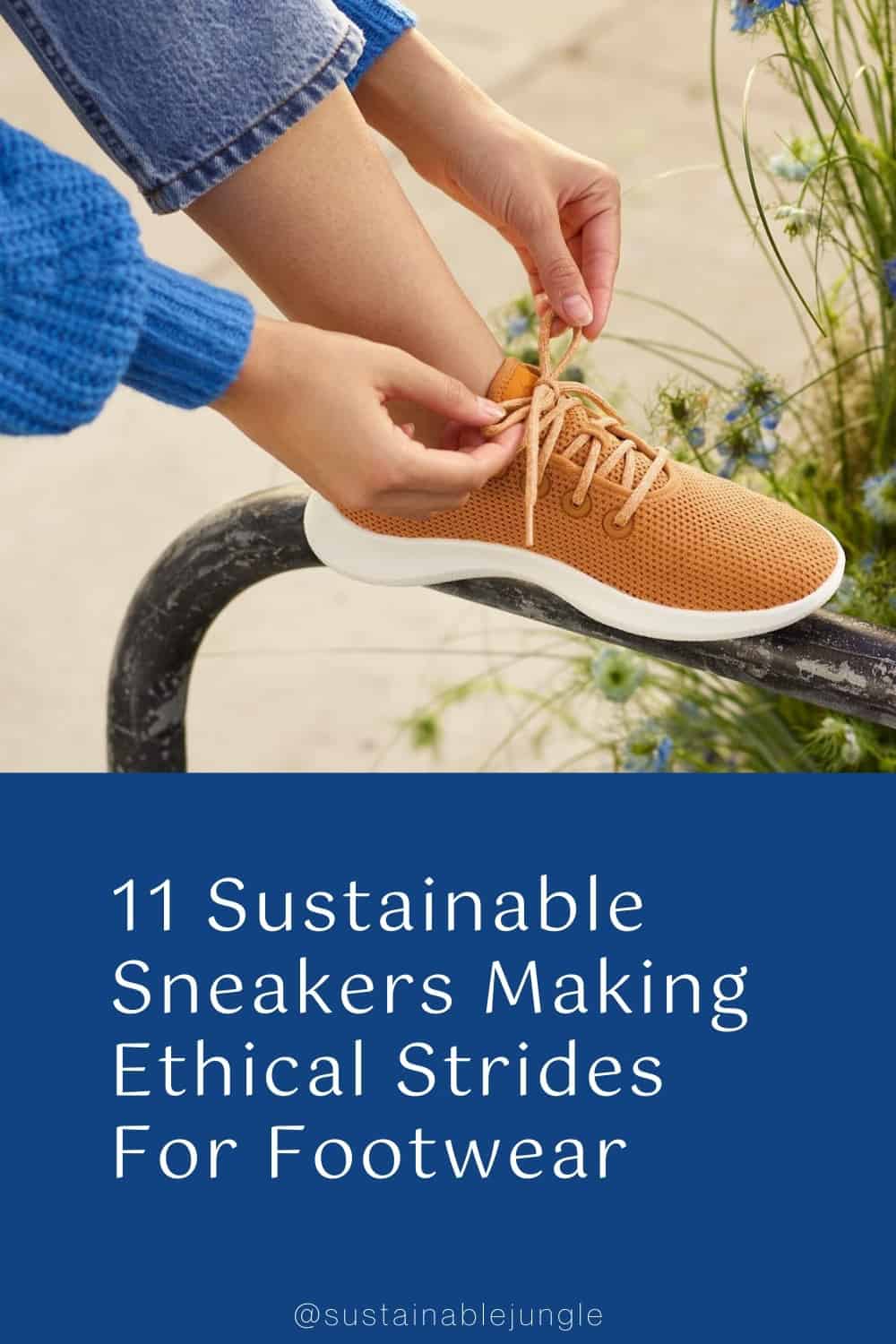
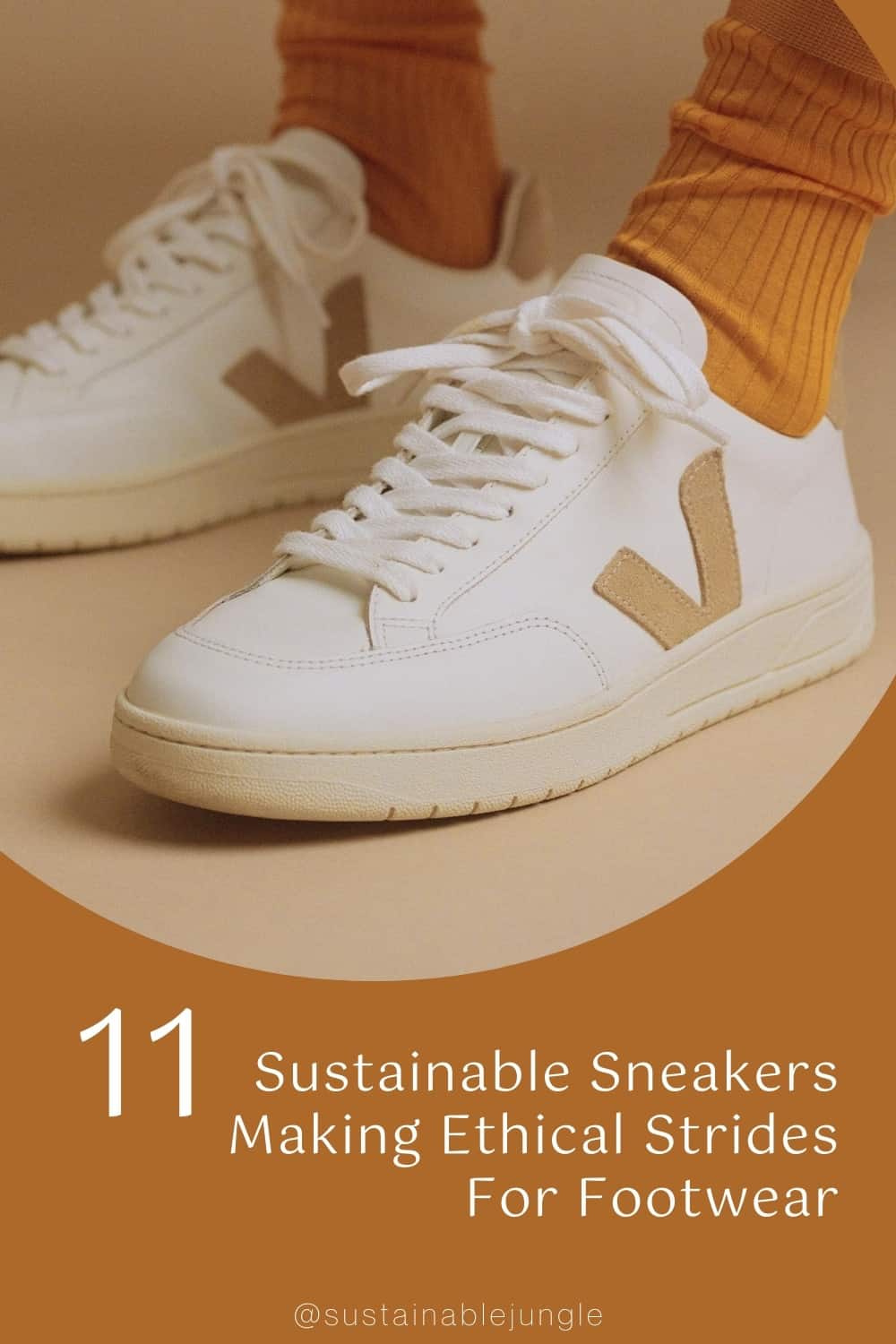

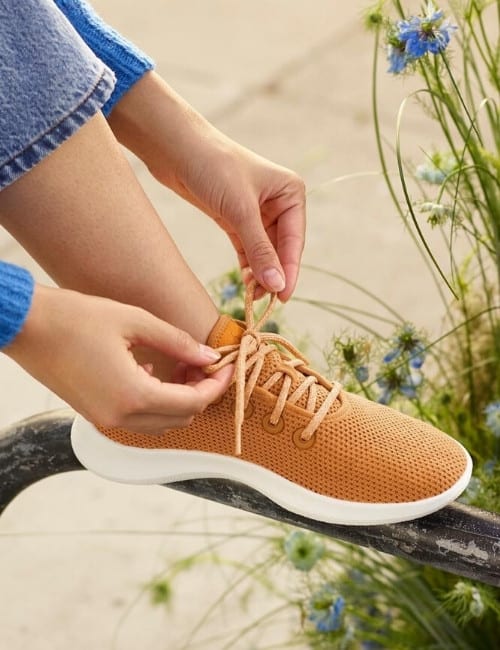
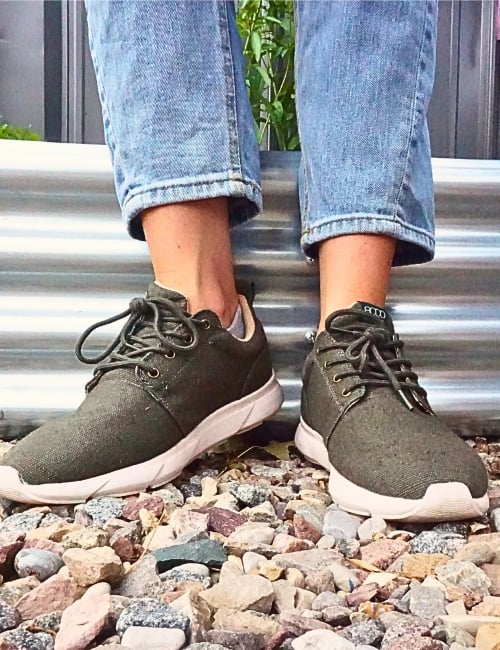
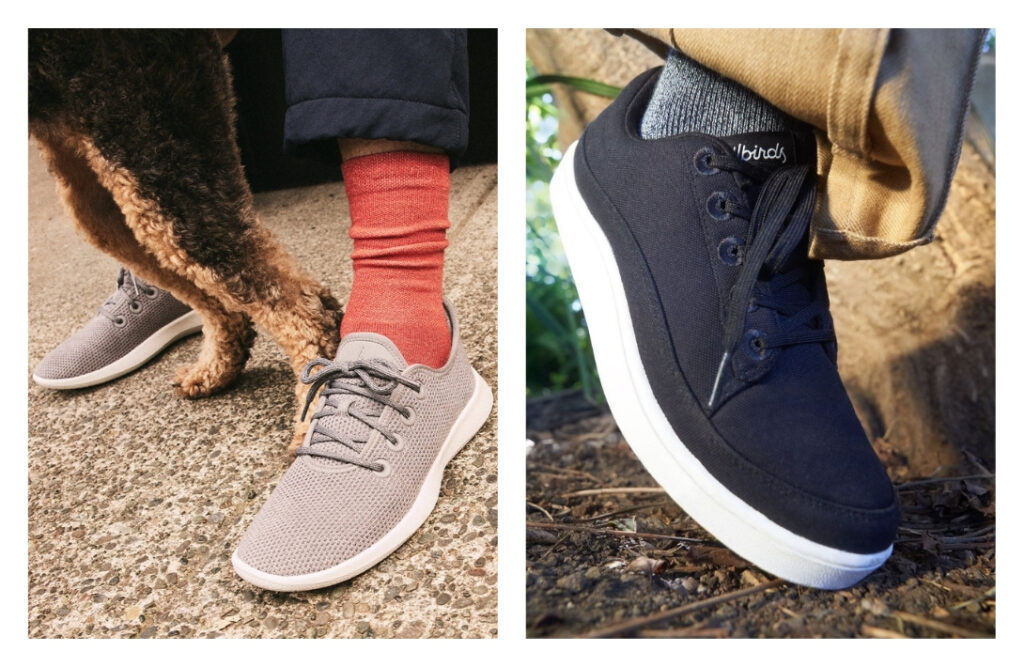
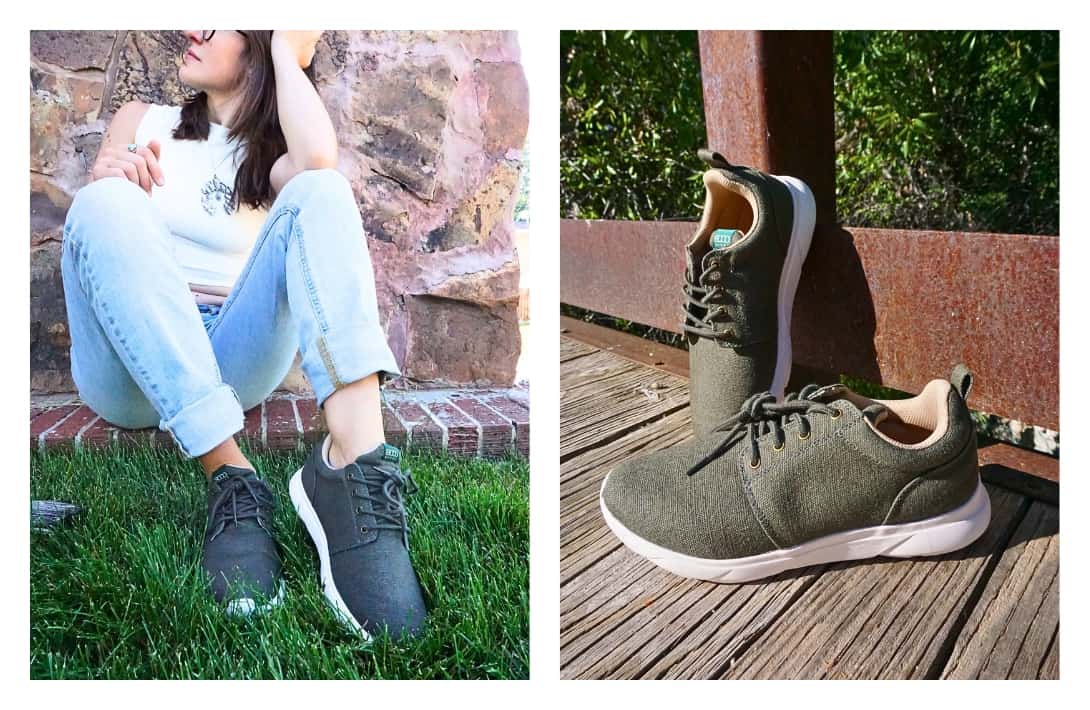
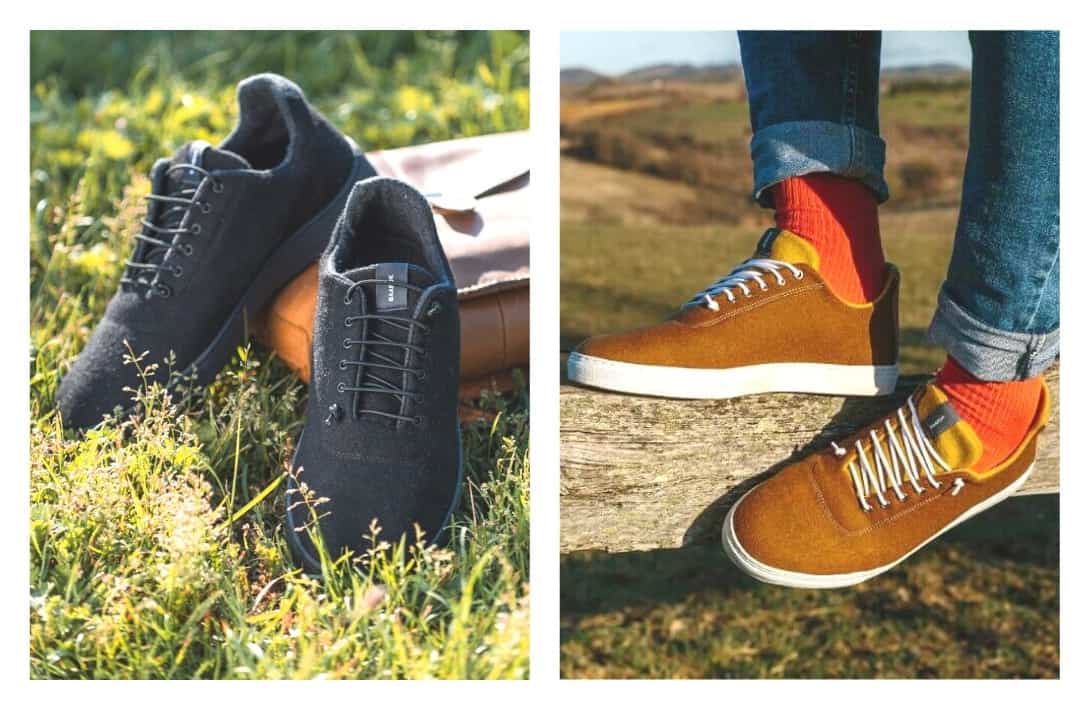
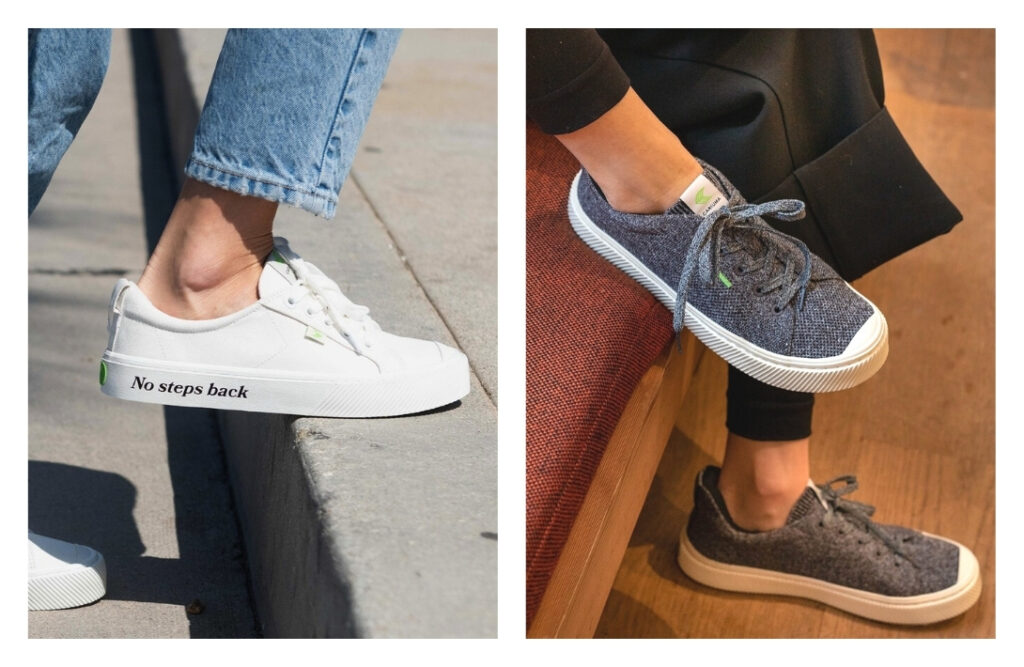
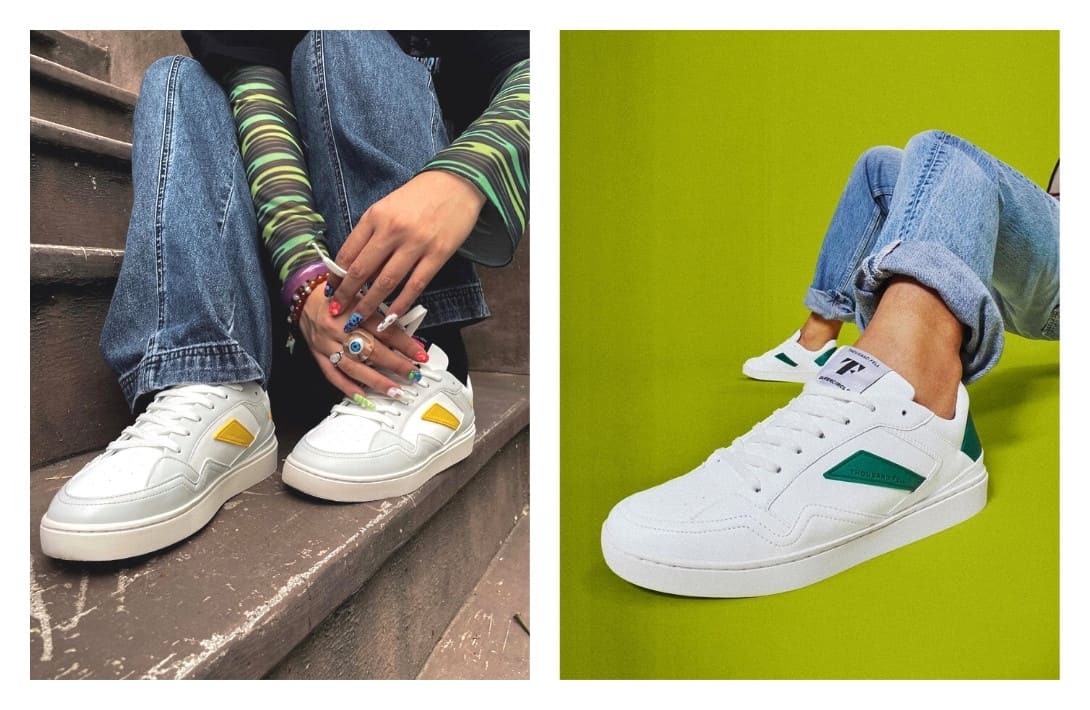
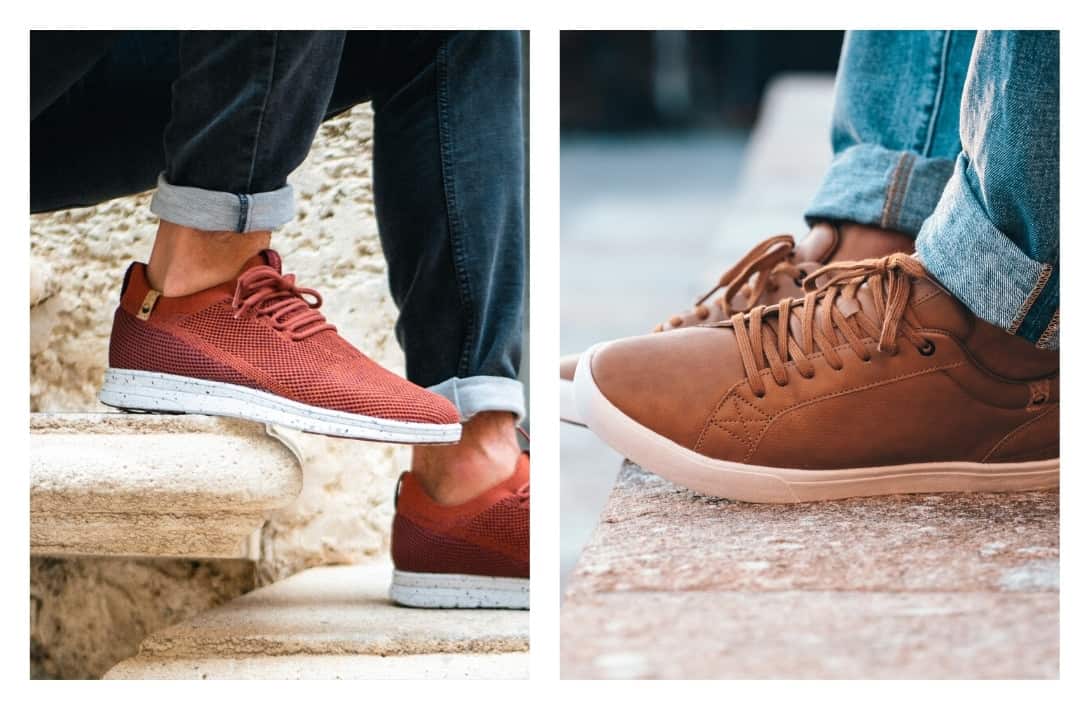
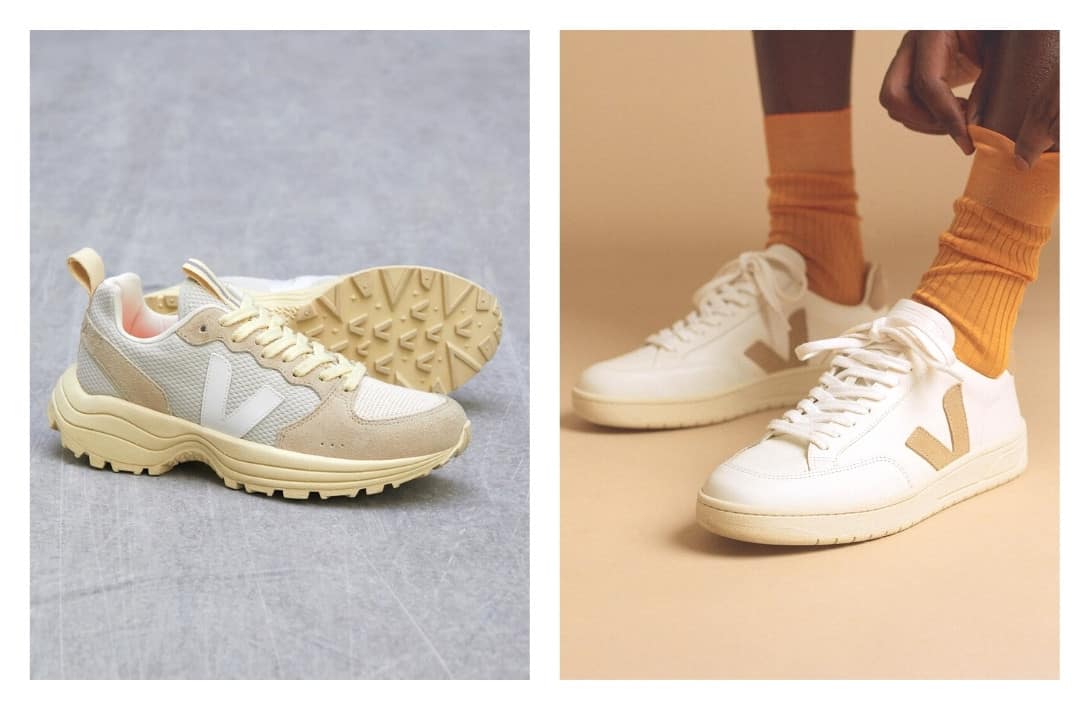
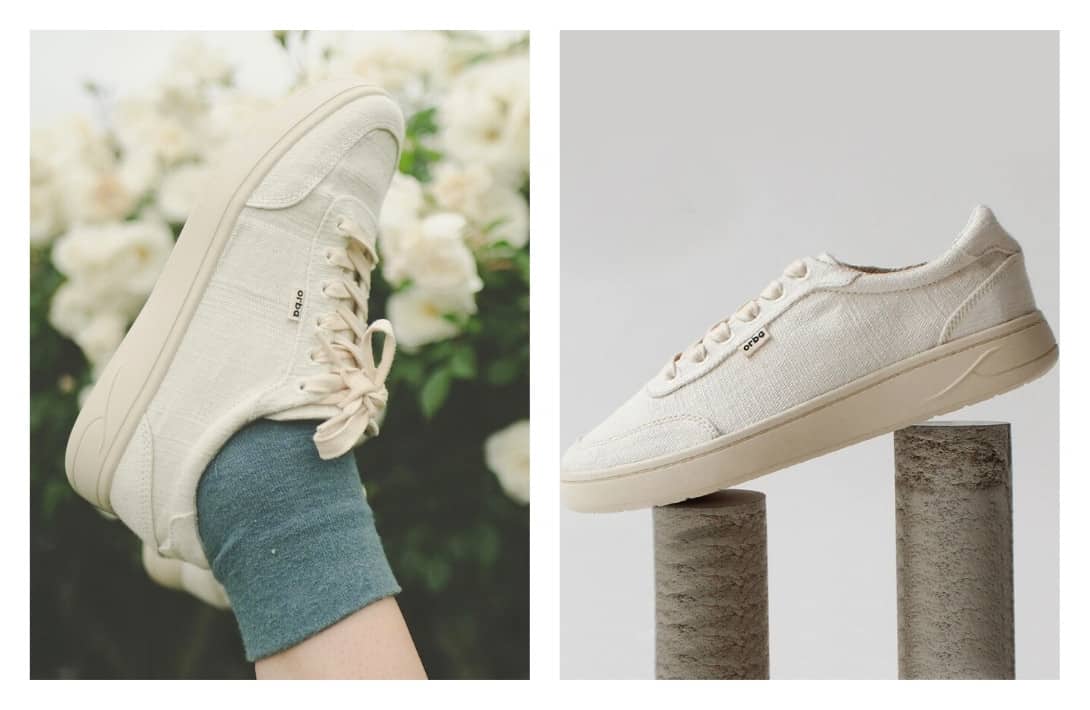
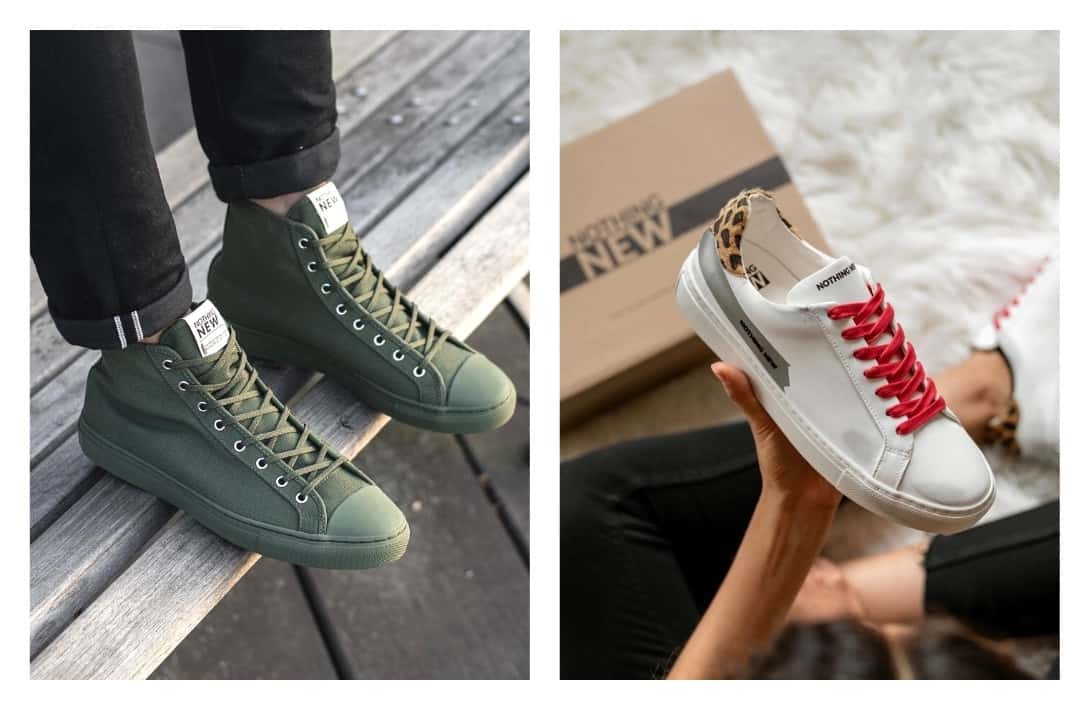
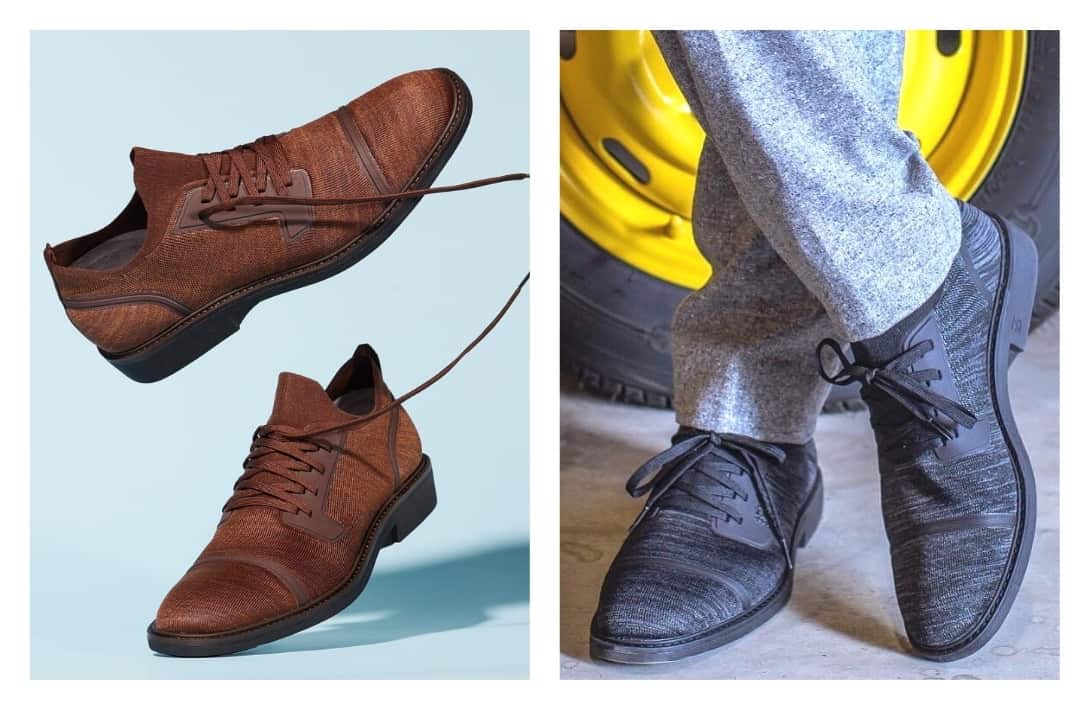
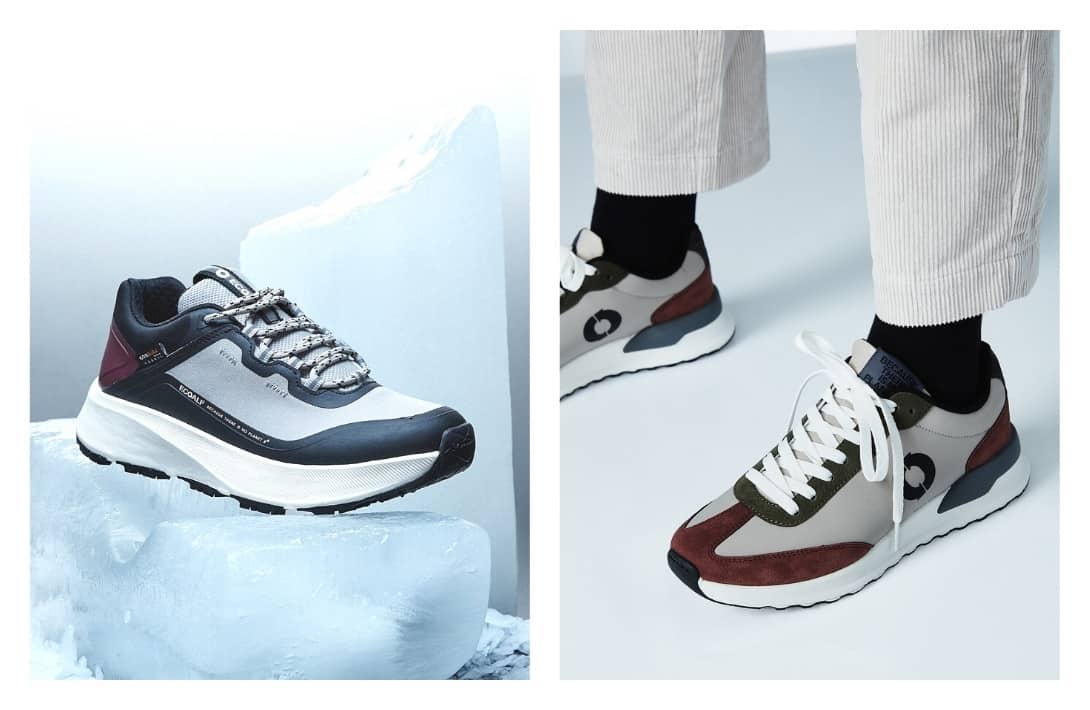
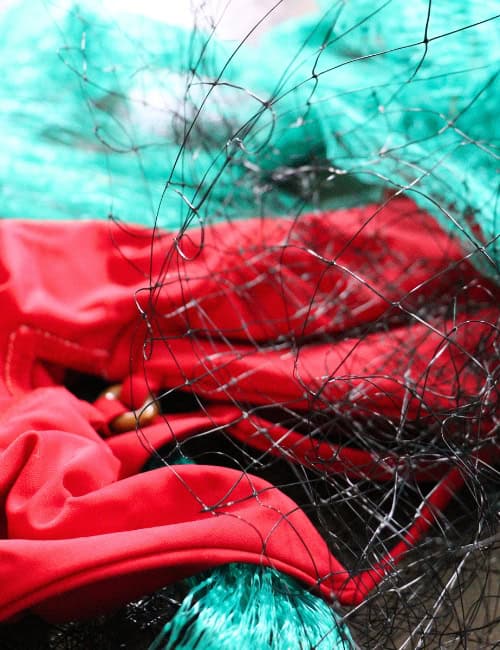

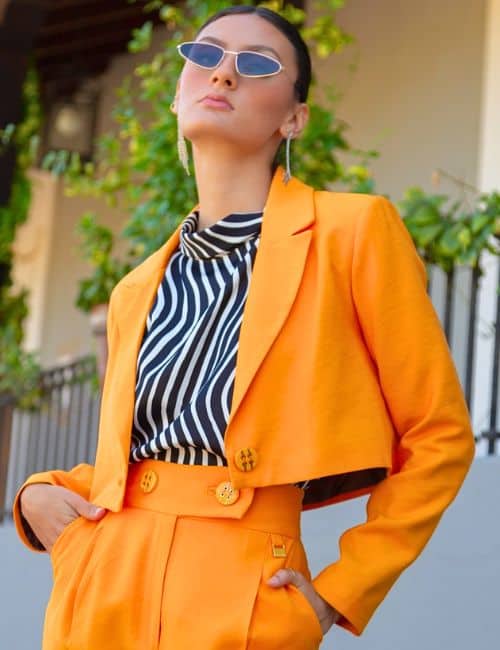
Thanks for this very interesting article!
I didn’t know many companies … so thanks to the description of each one it helped me to understand a little more about their eco-sustainable choices.
In particular, the history of the Saola company is interesting, I bought the Cannon Rose Gold from them and they are very comfortable!
I found a similar pair of shoes in the ACBC store. Now I can’t do without both!
Very detailed and complete article with all useful information, congratulations again 🙂
Super interesting article. I would love to know your opinion about the French brand VEJA?
Hey Larissa, thanks for the comment! Veja looks interesting! We’ll take a look on our next update of this article, thanks for the suggestion!